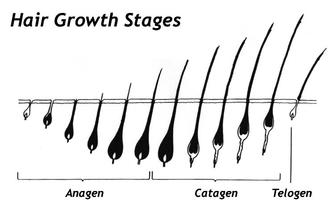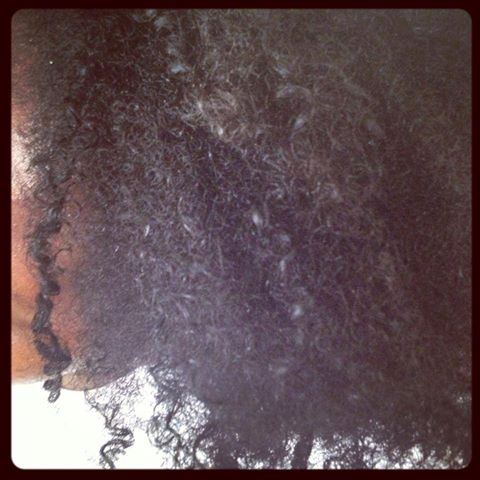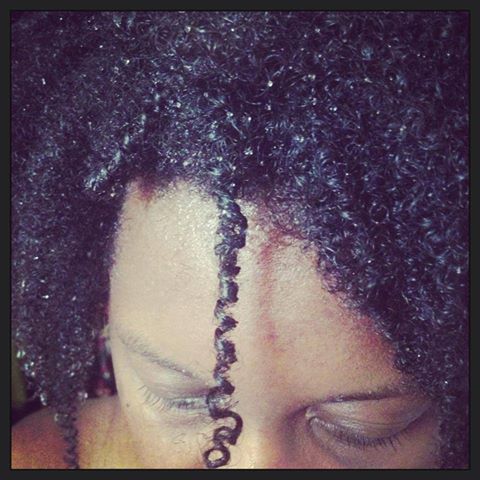|
I’ve always enjoyed swimming. Whenever I want a swim I make it coincide with my hair washday, usually Sunday. The rest of the week I jog.
Unfortunately, after about 18 weeks of pregnancy, jogging became tough for me so I started swimming more regularly. Having to detangle and wash my hair carefully 2 to 3 times a week was never going to work with my lifestyle so I started wearing lots of cornrow styles. In fact, I actually started earlier in my pregnancy than that because I was frequently too tired for my hair in the first 3 months of pregnancy. Anyhow, if you wear protective cornrow hairstyles you’ll be able to maintain the style for at least four weeks before it starts looking tatty and after your swim you only need 5 minutes to clean it. Wash Routine For Regular Swimmers After every swim I used the mild but effective Queen of Kinks Shampoo and I followed up with the conditioner. I let the conditioner sit whilst I showered and rinsed it off last, just before I left the shower. My hair air-dried and later on I moisturized with the Queen of Kinks Moisturizer plus a thin layer of the oil treatment. After 7 months of this, my hair is still in great condition. It is so low effort and works perfectly for the busy, regular swimmer. You could also try regularly twisting your hair but frankly that will require a little more maintenance and touching up than cornrow styles. Other styles that are good include, TWAs especially very short ones because they tend to be low-maintenance and flat twists, although they are less durable than cornrows. 
Get your FREE ebook on How To Grow Long, Healthy Natural Kinky or Curly Hair.  Check out Queen De Johnson's Hair Journey & Regimen Check out Queen De Johnson's Hair Journey & Regimen
In my last blog I talked about whether or not Hair Grows Thicker & Faster In Pregnancy.
It turned out that hair might grow thicker and/or faster but after delivery 40-50% of women experience Telogen Effluvium, or simply post partum hair loss. Telogen Effluvium can happen 1 to 5 months after pregnancy but is most common around the 3-month point following delivery. What can you do about post partum hair loss? Not much, you can:
Do you know of any other solutions to post partum hair loss? Please share your experiences in the comments section. References:
 Check out Queen Shamika's Hair Journey & Regimen Check out Queen Shamika's Hair Journey & Regimen
Every person you ask will tell you a slightly different story, however, there is a scientific reason behind the observation that hair grows a little thicker and faster during pregnancy. Firstly, you need to remember the hair growth phases:
HAIR GROWTH PHASES All hair has three growth phases: 1. Anagen phase: hair growth Can last 1 to 10 years, but is 4 to 7 years on average. According to The Science of Black Hair, 88% of the hairs on your head are in the anagen (growth) phase at any one time. 2. Catagen phase: hair resting Lasts anywhere from 4 weeks to 4 months; 1% of the hairs on your head are currently in the catagen (resting) phase. 3. Telogen phase: hair shedding 11% of the hairs on your head are currently in the telogen (shedding) phase. These hairs either come out on their own or are pulled out during styling. If you have braids or dreadlocks the shed hairs don't fall out because they are restricted from doing so.  Check out Queen Roshell D's Hair Journey & Regimen Check out Queen Roshell D's Hair Journey & Regimen
It is normal to lose 50 to 100 hairs per day if you are not pregnant. The average head of hair has 100,000 hairs on it so don't worry this is not enough for you to go bald.
What Happens To Hair Growth Phases DURING Pregnancy When you get pregnant the surge in hormones causes hair to get locked in the hair resting phase and normal shedding does not occur. That is, the telogen phase is prevented from occurring during pregnancy. In fact, according to AmericanPregnancy.org “during pregnancy, an increased number of hairs go into the resting phase.” I interpret this to mean more hairs than usual. I recently braided my hair and the amount of hair on the comb after a blow dry was ridiculous; it was literally nothing. I would expect to shed 6 or 7 times what I saw on the comb without worrying but I lost very little. I had just washed and conditioned using the Queen of Kinks product line and I would have loved to put it all down to that but I knew pregnancy had a lot to do with it. Pregnancy Vitamins In addition, many pregnant women are encouraged to take pregnancy vitamins especially in more developed economies. These help to nourish hair and aid in hair growth. If you’re not taking vitamins, a deficiency might occur because more of your resources are taken up by the development of your baby. In this case you can incur hair loss during pregnancy despite the surge in hormones that stop the shedding process. 
What Happens To Hair Growth Phases AFTER Pregnancy
According to AmericanPregnancy.org the most common period of pregnancy related hair loss occurs approximately three after the delivery. Hair that was trapped in the resting phases during pregnancy may even all fall out at once! Ouch. This is apparently normal and hair does return to its normal growth cycle within 6 to 12 months of delivery. What is Telogen Effluvium? This whole process in which hair sheds “excessively” following birth is called Telogen Effluvium. It can happen 1 to 5 months after pregnancy but as mentioned above the 3 month point is the most common time when it happens. Do all mothers experience Telogen Effluvium? No, just 40-50%. Well, I say just but that is a heck of a lot. What has been my experience? I am 37 weeks pregnant now. At the start of pregnancy I thought my hair was unusually dry but this passed after about three months. Did my hair grow faster during pregnancy? No, I don’t think so. Was my hair thicker during pregnancy? I think it has been a little thicker, yes. I’d love to “woop woop’ right now but I’ll wait until 6 months post pregnancy to see if it lasts before I celebrate. Please share your experience in the comments section. References:

|
I now blog about wealth creation - so if you have any money questions meet me there, you can do all sorts of cool things like leave me a voicemail.
By Heather Katsonga-Woodward
I was a natural hair blogger and mixtress living between London & Chicago from 2012 to 2017. I always thought I was 4C but some say 4B; images below - you decide! Heather xx Categories
All
Archives
November 2016
|




















